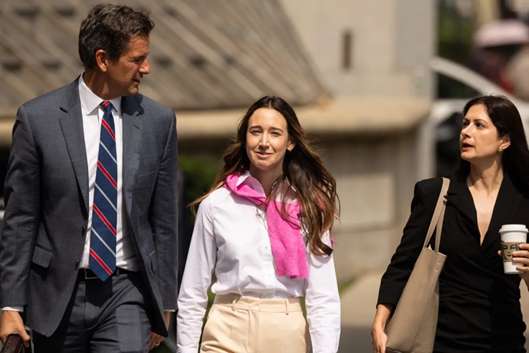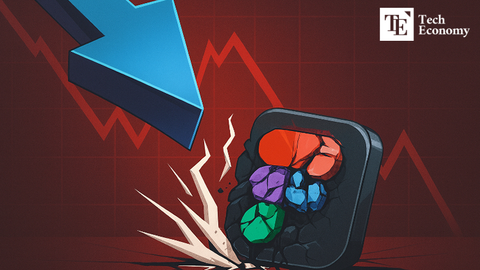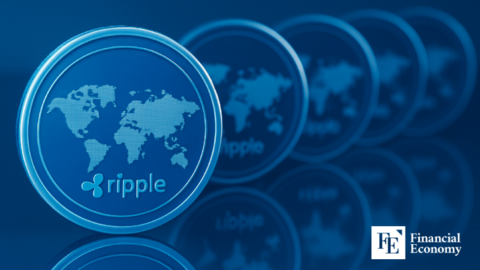Is This 32-Year-Old a Brilliant Founder, or a Deceptive Fraudster?
Input
Changed
Charlie Javice and Frank's Ascension Buyer's Remorse Consequences of the Trial

Charlie Javice and Frank's Ascension
The story of Charlie Javice, founder of the startup Frank, has developed into a captivating narrative that explores the delicate balance between entrepreneurship and fraud, as well as ambition and deception. Javice, who was 32 years old at the time, was once celebrated as a trailblazer in the technology sector for her efforts to simplify the intricate process of financial assistance for college students. Nevertheless, she is currently embroiled in a legal dispute that has impeded her career aspirations, as of early 2025. Javice allegedly defrauded JPMorgan Chase, one of the world's largest financial institutions, regarding the value of her company. Consequently, she is currently facing criminal charges. One of Silicon Valley's most contentious fraud cases in recent memory has emerged from a groundbreaking student aid concept.
The legal case against Javice raises significant questions regarding the ethical boundaries that entrepreneurs are prepared to breach in order to achieve success. Was Javice a brilliant founder who made a tragic misstep, or was she a fraudster who deliberately sought to inflate the value of her venture and mislead investors? The evidence presented and the ongoing trial are expected to have significant repercussions on the broader culture of Silicon Valley, as well as on her future.
Charlie Frank was established by Javice in 2017 with a defined objective: to streamline the student financial aid applications procedure. The concept was founded on the recognition that the financial aid process in the United States was complex and challenging to navigate. Frank pledged to increase the accessibility of college financing for students from all backgrounds by providing a user-friendly platform for completing the Free Application for Federal Student Aid (FAFSA). The startup experienced rapid growth, which attracted the attention of investors, universities, and government officials who recognized the potential for disruption in the education financing industry.
Javice's presentation was persuasive. Frank committed to be the technological solution to an age-old issue: assisting students in navigating the bureaucratic labyrinth of financial aid applications. The platform acquired a following, and by 2021, it had captured the attention of JPMorgan Chase, which recognized an opportunity to incorporate Frank's services into its broader financial offerings. Frank was acquired by JPMorgan for a substantial sum of $175 million in a move that was initially perceived as a significant victory for the startup. The acquisition was anticipated to significantly enhance the bank's student loan and financial assistance products
Frank appeared to be on the brink of revolutionizing the financial aid landscape for a period of time. Javice's achievement was a testament to her vision and capacity to execute. Nevertheless, as the transaction advanced, concerns regarding the extent of Frank's user base became increasingly prevalent. What initially appeared to be a straightforward software solution for student financial aid was soon entangled in a convoluted web of legal allegations and accusations of fraud.
The controversy was initiated when JPMorgan Chase asserted that Frank had embellished its user base in order to present the company as more successful than it actually was. The financial giant claims that Javice and her team provided fraudulent data to persuade JPMorgan to acquire the company at such a high valuation by misrepresenting the number of users on the platform. Javice and her associates at Frank, according to JPMorgan's allegations, inflated the company's perceived value by fabricating the number of customers through the creation of fake accounts.
This is the point at which allegations of deception are raised. Javice and Olivier Amar, Frank's Chief Growth Officer, are accused by JPMorgan of intentionally fabricating documents to inflate the company's user base, which was a critical selling point during the acquisition negotiations. The bank's argument is predicated on the notion that Frank's user data was manipulated to deceive JPMorgan into believing that the company had millions of active users, which may not have existed at all.
Javice and Amar have been accused of wire fraud, conspiracy, and falsification of records in a lawsuit filed by JPMorgan in response to these allegations. The bank asserts that it was deceived into purchasing Frank on the basis of exaggerated figures, which resulted in a financial loss for JPMorgan when the truth about the user base was revealed.

Buyer's Remorse
The defense team of Charlie Javice endeavored to divert attention from the allegations of fraud during the trial by contending that JPMorgan's allegations were based on "buyer's remorse." The bank's allegations, according to her attorney, were an attempt to withdraw from a transaction that it regretted. In essence, the defense posits that JPMorgan was dissatisfied with the company's performance following the acquisition and made an effort to attribute its own unsuccessful investment to Frank's founders.
The "buyer's remorse" defense is predicated on the notion that the bank's dissatisfaction with the acquisition transaction prompted it to fabricate a story about fraud in order to preserve its reputation. Nevertheless, this argument has been met with skepticism in the legal community, as critics contend that a defense of this nature is unlikely to absolve Javice of culpability if she and her team intentionally fabricated data.
Although "buyer's remorse" is a prevalent theme in business disputes, it is generally not regarded as a valid legal defense when fraud is involved. The defense of buyer's remorse may not be valid if the evidence demonstrates that Frank's leadership engaged in deliberate deception. The trial's outcome will be contingent upon the prosecution's ability to establish that Javice's actions were deliberate and fraudulent, rather than the result of a miscommunication or misunderstanding between the parties. The stakes are high for Javice.
In order to gain a comprehensive understanding of the severity of the situation, it is crucial to examine the broader cultural context in which Charlie Javice's actions occurred. Silicon Valley is renowned for its high-risk, high-reward environment, in which entrepreneurs are expected to generate substantial returns for investors and attract funding by swiftly scaling their businesses. In such an environment, there is frequently significant pressure to exaggerate progress, demonstrate rapid development, and present a business in the best possible light, sometimes at the expense of complete transparency.
Entrepreneurs in Silicon Valley are frequently commended for their capacity to "sell" their vision, and it is not uncommon for them to inflate user numbers or embellish business metrics. In order to attract venture capital or large corporate purchasers, numerous startups implement "growth hacking" strategies to artificially elevate their metrics. These practices may be perceived as a component of the entrepreneurial hustle, which is a set of unspoken principles that are responsible for the fast-paced startup environment.
Nevertheless, there is a distinct distinction between fraud and daring entrepreneurship. Although certain entrepreneurs may employ questionable strategies to create the illusion of growth, the legal and ethical repercussions of crossing the line into blatant deception can be severe. In Javice's case, her actions were purportedly not merely about exaggerating the truth; they also allegedly involved the fabrication of customer data in a manner that deceived an entire financial institution.
A mindset in which "bending the truth" appeared to be an acceptable business strategy may have been influenced by the culture of Silicon Valley, which emphasizes development at all costs. However, the repercussions can be catastrophic when the distinction between marketing and deception is unclear.

Consequences of the Trial
Frank and Charlie Javice's legal dispute is far from concluded. The case has already attracted attention to the ethical standards of the startup world and may serve as a wake-up call for both investors and entrepreneurs. The case will serve as a stark reminder of the risks associated with fraud in business and the significance of conducting due diligence when acquiring companies if the allegations against Javice are proven to be accurate.
The trial is a pivotal moment for Silicon Valley. The necessity for increased transparency and accountability has never been more urgent as the startup ecosystem continues to expand. The practices that have long been tolerated in the high-stakes world of tech entrepreneurship are beginning to be questioned by both investors and consumers. If nothing else, the Charlie Javice case should serve as a reminder that, in the fiercely competitive world of Silicon Valley, integrity must always take precedence over ambition in the business world.
In conclusion, a fundamental question regarding the nature of success in the startup world is at the core of the case against Charlie Javice. Was Javice an ambitious, brilliant entrepreneur who committed a costly error? Or was she a charlatan who exploited the system for her own benefit? The trial may yet reveal the truth, but one thing is certain: the repercussions of this case will be felt throughout the technology industry for years to come. If Javice's actions are found to be fraudulent, they could serve as a cautionary tale for those who conflate entrepreneurship and deception. The narrative of Frank will eternally serve as a reminder that integrity cannot be compromised in the pursuit of success in the startup world, irrespective of the outcome of the trial.





















